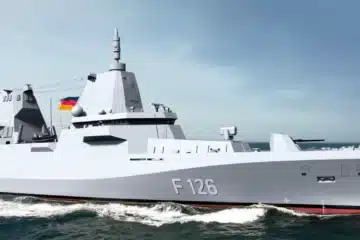The current multi-purpose frigates in service of the Royal Netherlands Navy and the Belgian Navy (known as M-Frigates or Karel Doorman-class) are reaching the end of their life-cycle. The next generation will replace these two Dutch (Van Amstel & Van Speijk) and two Belgian (Leopold I & Louise Marie) M-frigates from 2024.
While their primary role will be anti-submarine warfare (ASW), the new frigates must be able to independently defend themselves as well as protect nearby units against air and surface threats. For this purpose, they will be equipped with a new generation surface warfare fire control system, called AWWS.

The development of AWWS has become necessary because above-water threats are growing exponentially in terms of complexity, coordination and speed. Missiles go up to three times faster than the speed of sound, and possibly even up to five times faster in 2020. Currently used technologies are insufficient to make use of all the new sensor and weapon systems to counter these threats in the future. This new system continuously generates the best solution to counter any incoming threats, whatever the environmental conditions or threat complexity. The system will support the operator in making the right decision at every decisive moment.
“We are dealing with threats 3 times the speed of sound, by 2020 this could increase to 5 times speed of sound”
Arie-Jan de Waard, Director, DMO
When faced with scenarios of several different threats arriving simultaneously and employing complex behaviours, such as very high speed, a human operator will no longer be able to schedule and plan the right defensive priorities effectively and efficiently. However, AWWS will offer the operator information to make the right decisions within seconds, so the ship can protect itself successfully and continue on its mission.
AWWS will consist of a new generation of sensors, coupled with intelligent software that continuously calculates which actions are best suited to tackle each threat detected by radar and other sensors in the right manner. This maximizes the chance of survival, while the crew stays in control.
This system uses the latest sensor technology from Thales to detect and monitor all above-water threats, including the next-generation, fully digital dual-band X/S radar suite: an integral combination of Active Phased Array Radar (APAR) and Sea Master 400 radar technologies.
Prior to the AWWS contract, the Dutch Ministry of Defence initiated advanced research into this technology with DMO, TNO and Thales more than ten years ago. This resulted in an agreement for a “technology demonstrator”. The technology demonstrator will eventually be installed at a shore-based test site for tests and trials.

“For many decades, the naval building cluster, knowledge institutes and Defence have been supplying modern and technologically advanced products in what we call the Triple Helix. These products are essential for our national security. The Triple Helix is therefore a priority technology area in our new Defence Industry Strategy. It is great we are taking an important step for this priority with the development of the AWWS project with Thales”
Arie-Jan de Waard, Director, DMO
“Thales has been a supplier for the Royal Netherlands Navy for almost 100 years. We have developed multiple systems in collaboration with the Royal Netherlands Navy in the past. I am proud that we can contribute to the Dutch Navy through the AWWS contract. Together, we can set the new standard for the rest of the world. This development will also strengthen the opportunities of the Dutch Industry in the big development programs in Europe and beyond.”
Gerben Edelijn, CEO, Thales Nederland B.V.





